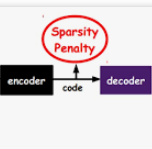Wasserstein dictionary learning is an unsupervised approach to learning a collection of probability distributions that generate observed distributions as Wasserstein barycentric combinations. Existing methods for Wasserstein dictionary learning optimize an objective that seeks a dictionary with sufficient representation capacity via barycentric interpolation to approximate the observed training data, but without imposing additional structural properties on the coefficients associated to the dictionary. This leads to dictionaries that densely represent the observed data, which makes interpretation of the coefficients challenging and may also lead to poor empirical performance when using the learned coefficients in downstream tasks. In contrast and motivated by sparse dictionary learning in Euclidean spaces, we propose a geometrically sparse regularizer for Wasserstein space that promotes representations of a data point using only nearby dictionary elements. We show this approach leads to sparse representations in Wasserstein space and addresses the problem of non-uniqueness of barycentric representation. Moreover, when data is generated as Wasserstein barycenters of fixed distributions, this regularizer facilitates the recovery of the generating distributions in cases that are ill-posed for unregularized Wasserstein dictionary learning. Through experimentation on synthetic and real data, we show that our geometrically regularized approach yields sparser and more interpretable dictionaries in Wasserstein space, which perform better in downstream applications.
翻译:瓦塞斯坦字典学习是一种不受监督的方法,用于学习一系列概率分布的收集方法,这些概率分布以瓦塞斯坦巴氏中心组合的形式产生观测到的分布。瓦塞斯坦字典学习的现有方法优化了一个目标,即寻求一个具备足够代表性的字典,通过以巴鲁中心内部插图来接近观察到的培训数据,但不会对与字典相关的系数施加额外的结构性属性。这导致词典密集地代表了观察到的数据,使得对系数的解释具有挑战性,而且在使用下游任务中学到的系数时,也可能导致经验性表现不佳。相反,由于在欧克林德空间的字典学习稀少,我们提议为瓦塞斯坦空间提供几何上稀少的固定定序器,仅用附近的字典元素来促进数据点的表达。我们展示了这种方法,导致瓦塞斯坦空间空格中的空格,并解决了非核心代表性问题。此外,当数据是作为瓦塞斯坦标准分配的中选,这种定调器有助于在不规范的瓦塞斯坦字典中恢复生成的分布。我们通过对不正规的瓦塞斯坦字典进行更精确的地理分析,从而显示我们在空间空间上进行更精确的压的压。































































































































































